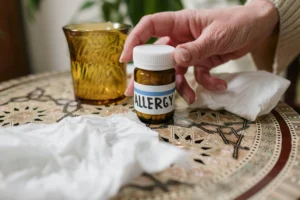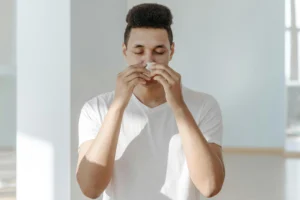Spring is a beautiful time of year, but it is also the start of allergy season for millions of Americans. According to the Centers for Disease Control and Prevention (CDC), 25.7% of adults and 18.9% of children had a seasonal allergy or hay fever in 2023. As the weather gets warmer outside and plants start to bloom, pollen and other allergens fill the air, triggering uncomfortable symptoms in those with seasonal allergies.
In this article, we will delve into five tips to fight off spring allergies so you and your loved ones can fully embrace the season.
Understanding Spring Allergies
As flowers bloom and trees blossom, they release pollen into the air, triggering allergic reactions in susceptible individuals. Depending on where you live, allergens may vary. Still, common culprits include pollen from trees like oak, birch, cedar, grasses, and weeds.
The signs and symptoms of spring allergies range from mild to severe, and may include:
- Sneezing
- Itching on the nose, eyes, roof of the mouth, throat
- Runny nose and eyes
- Nose congestion
- In some cases, allergies can also exacerbate asthma symptoms or lead to sinus infections.
However, spring allergy symptoms can be similar to those of other respiratory conditions. Learning more about the differences between a cold, the flu, allergies, and COVID-19 is important to ensure proper diagnosis and treatment.
1. Start Medications Before Symptoms Begin
One of the most effective ways to fight off spring allergies is to start taking allergy medications before symptoms even begin. By taking preventative action, you can reduce the severity of your allergic reactions and avoid uncomfortable symptoms altogether. It is recommended to start medications 2-4 weeks before allergy season begins to the point where you are protected against pollen allergies. However, it is essential to note that medications are not a cure for the allergy itself, but they will treat the symptoms. If stopped, symptoms will likely come back.

Over-the-Counter vs. Prescription Medications
Individuals can choose between over-the-counter (OTC) and prescription options when considering medications. OTC antihistamines like cetirizine (Zyrtec) and loratadine (Claritin) can provide relief for mild to moderate allergy symptoms. These medications inhibit the release of histamine, which initiates allergic reactions. For more persistent or severe cases that impact daily routines, your healthcare provider may suggest prescription medications like nasal corticosteroids.
2. Keep the Indoors Clean
Creating a clean indoor environment is essential for minimizing exposure to allergens. Investing in air filtration systems, like a HEPA filter (high-efficiency particulate air), can help trap particles that cannot be seen without a microscope but can easily penetrate the lungs, like pollen and other tiny airborne allergens. Additionally, maintaining a regular cleaning routine, including vacuuming carpets, dusting surfaces, and washing bedding, can reduce allergen buildup in the home.
3. Monitor Pollen Counts
Adjusting your outdoor activities to coincide with lower pollen counts can effectively fight off spring allergies. Pollen concentrations typically peak in the mornings and on windy days. Adjusting outdoor activities to lower pollen counts, such as late afternoon or after rainfall, can help reduce symptoms.
Using Pollen Count Resources
Several online resources and apps can help you track pollen levels in your area, such as the National Allergy Bureau’s pollen count map or the National Allergy Forecast. These resources provide information on the top allergens and the severity of pollen levels. For instance, if tree pollen levels are high, you may avoid outdoor activities like picnics or hikes in wooded areas. Similarly, if grass pollen is prevalent, you might opt for indoor exercise instead of outdoor sports.
By staying informed about pollen levels, you can better plan your activities and minimize exposure.
4. Shower and Change Clothes After Being Outdoors
After spending time outdoors, shower and change clothes promptly. This simple step helps rid your skin and clothing of pollen and other allergens, significantly reducing the risk of triggering allergic reactions. Moreover, routinely washing bedding in hot water can effectively remove allergens that have built up on sheets and pillowcases.

5. Consider Allergy Shots
Long-Term Allergy Management
For long-term allergy management, allergy shots, also known as immunotherapy, may be recommended. These injections work by gradually desensitizing the immune system to specific allergens, reducing the severity of allergic reactions over time. While allergy shots require a commitment to a series of injections over several months, they can provide lasting relief for individuals with severe allergies.
For those seeking effective solutions to fight off spring allergies, it is crucial to consider discussing various options with healthcare providers at Midlands Family Urgent Care. By consulting with our team, you can receive comprehensive allergy testing and personalized guidance on the best treatment options customized to meet your particular needs.
End Note
In conclusion, implementing these 5 tips to fight off spring allergies can help you enjoy the beauty of the season without constant discomfort. Remember to take proactive measures, such as starting medications preemptively, keeping indoor spaces clean, monitoring pollen counts, practicing good hygiene habits, and considering allergy shots for long-term relief.
But, if you or your loved one are struggling to manage allergy symptoms or have concerns about treatment plans, do not hesitate to schedule an appointment with our Midlands Family Urgent Care team. Our team is here to offer you peace of mind during allergy season and beyond, ensuring you receive the care and support you need.



